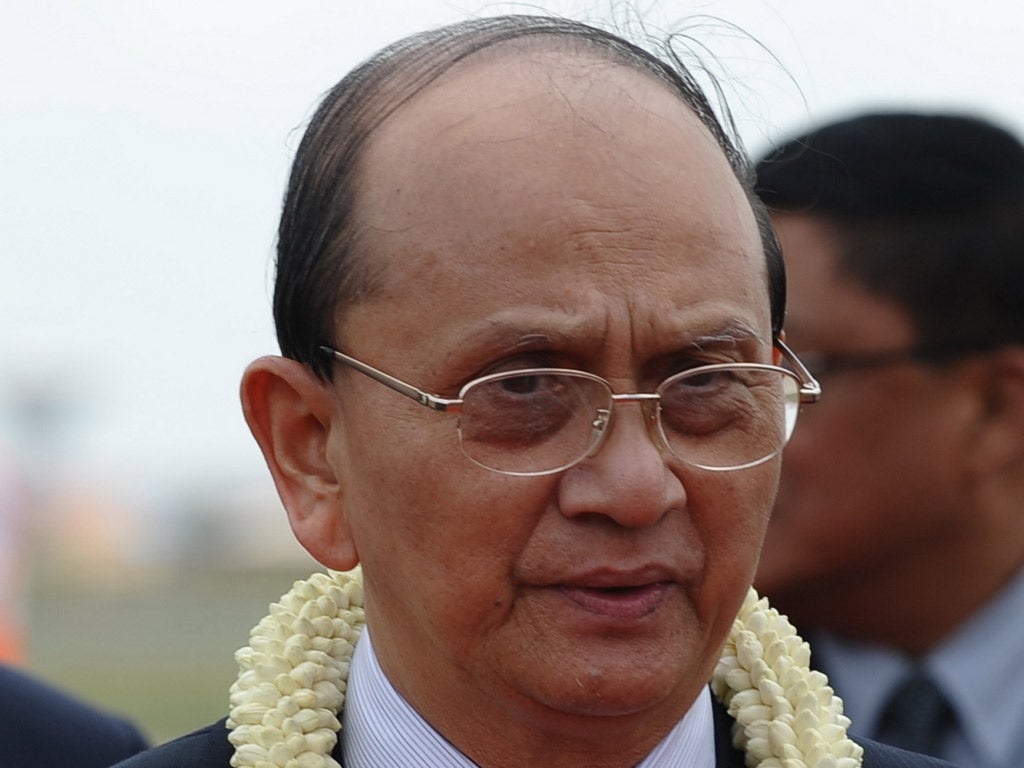Cameron ready to reward Burma for reforms by easing sanctions
Visiting Aung San Suu Kyi on final leg of his Asian tour, PM seems set to ask EU to change course

Your support helps us to tell the story
From reproductive rights to climate change to Big Tech, The Independent is on the ground when the story is developing. Whether it's investigating the financials of Elon Musk's pro-Trump PAC or producing our latest documentary, 'The A Word', which shines a light on the American women fighting for reproductive rights, we know how important it is to parse out the facts from the messaging.
At such a critical moment in US history, we need reporters on the ground. Your donation allows us to keep sending journalists to speak to both sides of the story.
The Independent is trusted by Americans across the entire political spectrum. And unlike many other quality news outlets, we choose not to lock Americans out of our reporting and analysis with paywalls. We believe quality journalism should be available to everyone, paid for by those who can afford it.
Your support makes all the difference.David Cameron will today call for sanctions against Burma to be eased if the country continues to pursue its path towards democracy.
On the final leg of his tour of Japan and South-east Asia, the Prime Minister will become the first premier of a leading Western country to visit Burma since military rule, imposed in 1962, was relaxed last year.
He will hold talks with Aung San Suu Kyi, the revered opposition leader who spent two decades mostly under house arrest before being elected an MP this month.
He will also meet Thein Sein, the Burmese President, and praise his drive to introduce democratic reforms. Yesterday the Prime Minister said he wanted to see for himself what is happening in Burma before making any decision on sanctions. But it looks increasingly likely that Britain will lead calls for the European Union to start to lift them when the issue is discussed by EU foreign ministers on 23 April. Until recently, the UK was among the most insistent that the restrictions should remain.
The proposed relaxation could prove controversial. Baroness (Glenys) Kinnock, the former Labour minister who chairs the all-parliamentary group on Burma, said Mr Cameron was right to acknowledge progress but warned against any "chipping away of sanctions".
She insisted it was too early to consider lifting the arms embargo or restrictions on industries such as mining and timber. "We have still not seen any repressive laws repealed and the constitution has not changed which means the military still have a monopoly of power," she said. Speaking in Malaysia yesterday after meeting the Prime Minister, Najib Tun Razak, Mr Cameron said: "If Burma moves towards democracy then we should respond in kind, and we should not be slow in doing that... Just as Britain played a leading role in Europe in placing tough sanctions on that [military] regime, if we are satisfied change is taking place, we should be the ones not being backwards in our response."
The Prime Minister added: "It seems as if the president of Burma is intent on taking a new path and wants to see a progressive flourishing of freedom and democracy." Mr Cameron said other leaders in the region believed the Burmese Government's desire for reform was genuine. "I hope that, following my meetings, I will have the confidence to go back to my country, back to others in the European Union, and argue that change in Burma is irreversible; in a world of difficulty and darkness and all sorts of problems, here is one bright light we should encourage."
Mr Cameron has been careful to balance praise for Aung San Suu Kyi with similar plaudits for the reforming government. He said: "Where reform is beginning, like in Burma, we must get behind it. So let's pay tribute to those who have for decades and at huge personal cost to themselves fought for that freedom and reform. Not least, of course, the inspirational Aung San Suu Kyi.
"Let's pay tribute also to the leadership of President Thein Sein and his government, which has been prepared to release political prisoners, hold by-elections and legalise political parties that had previously been outlawed."
Join our commenting forum
Join thought-provoking conversations, follow other Independent readers and see their replies
Comments